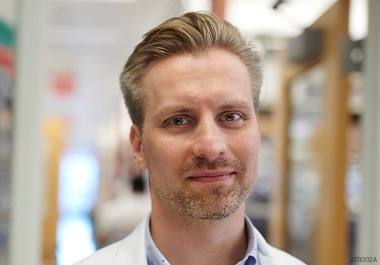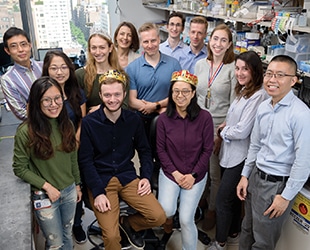Establishing Roots in Fundamental Biology with the AACR NextGen Grant: Dr. Tuomas Tammela

The AACR NextGen Grants for Transformative Cancer Research represent the AACR’s flagship funding initiative to stimulate highly innovative research from young investigators. This grant mechanism is intended to promote and support creative, paradigm-shifting cancer research which may not be funded through conventional channels. It is expected that these grants will catalyze significant scientific discoveries and help talented young investigators gain scientific independence. Tuomas Tammela, MD, PhD, an Assistant Member at Memorial Sloan-Kettering Cancer Institute, received the AACR NextGen Grant in 2018. His overarching goal is to discover pathways that drive distinct cellular phenotypes and to develop new therapeutic concepts aimed at targeting tumor cellular heterogeneity.
Dr. Tammela shares how AACR support has impacted his research and career and reflects on the future of lung cancer and pancreatic cancer research.
What has motivated you to pursue lung and pancreatic cancer as the focus of your research?
Lung and pancreas cancer together account for about 30% of all cancer mortality. Despite recent advances in new therapies and early detection approaches, much remains to be done to control these diseases. In my laboratory, we seek to understand the function of molecularly distinct cell states in lung and pancreas cancers. My hope is that this work will identify cell states that drive treatment resistance or tumor progression. Targeting these cell states would be a potentially transformative new therapeutic approach.

How important to you, at that stage of your career, was the AACR NextGen grant? Did it allow you to do things you might not otherwise have done?
The AACR NextGen grant was the very first extramural grant that I got as an independent investigator, so it will always be special to me. I received the award for a high-risk, high-reward idea and without much preliminary data. It is rare to see grants like this, especially on the federal side. The grant allowed me to begin a foray into a new direction, to make investments in novel models and technologies, and to hire the people to do the work. The grant is competitive, and receiving it was a boost to my confidence and validation that my research program was on the right track – and that I was working on something interesting. Since receiving this grant, I have received grants from the Mark Foundation, the V Foundation, the American Cancer Society, the Rita Allen Foundation, and several other foundations and federal sources (NCI and Department of Defense). I am forever grateful for the support from the AACR NextGen grant because it allowed me to generate much of the preliminary data that enabled me to get these other grants.
How have the findings from your AACR NextGen Grant impacted your research, the field of lung cancer research, and patient care?
The AACR NextGen Grant enabled studies that led to the discovery of a new particularly malignant cell state in lung adenocarcinoma, the most common subtype of lung cancer that alone is responsible for 7% of all cancer death here in the US and around the world. Our work was published in 2020 and it has garnered a lot of interest in the field ever since. Others in the field are now using the cell state as a biomarker and pursuing experimental work to better understand it. It has been great to be able to contribute these findings to the field. Our follow-up work is focused on better understanding the function of this cell state as well as discovering ways of targeting it therapeutically. I am hoping that our work would eventually also impact patient care.
Since its inception, the AACR grants program has contributed to the development of new and improved approaches to cancer diagnosis, treatment, and cure. What is your vision for the future of lung cancer and pancreatic cancer research? What areas of lung and pancreatic cancer research need more funding?
History has again and again shown that it is discoveries in basic science that advance our fundamental understanding of cancer as a disease and truly move the needle for patients and transform cancer care. Immunotherapies are a great example of one such breakthrough in cancer care, which has its roots in fundamental biology and basic science. These days there is a wealth of available drugs and other therapeutic approaches, which makes translational research easier. This type of work is often seen as more attractive because the risk is lower and the reward is more attainable. Even though translational work is important, we should not forget about investments in basic science. I firmly believe that we will eventually conquer cancer, but to get there, there needs to be robust support for research on fundamental biology. The AACR NextGen Transformative program is a great example of this type of investment.